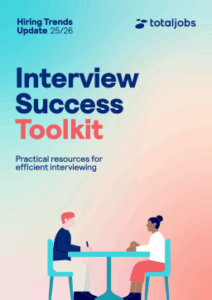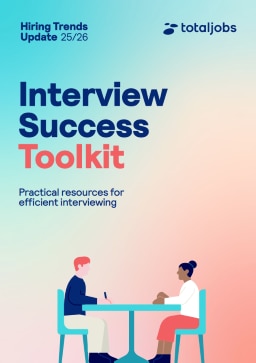
How to give interview feedback to candidates
Table of Contents
- Key takeaways
- What is feedback?
- The importance of feedback
- How to give feedback
- Interview feedback best practices
- What to avoid
- Interview feedback examples
- Mastering interview feedback
- FAQs

Interview Success Toolkit
39% of candidates say receiving no interview feedback leaves them with a negative experience, making constructive feedback essential to a positive employer brand. Plus candidates deserve insights they can use in their future job search.
In this guide, we explore the significance of feedback and provide actionable tips on how to give interview feedback to candidates professionally.
Key takeaways
- Prompt, thoughtful feedback reflects well on your organisation and can attract future talent.
- Deliver feedback quickly after the interview so insights are still actionable for candidates.
- Avoid generic responses, explain precise areas where candidates fell short and why the chosen candidate stood out.
- Be open, respectful, and ready to clarify if candidates seek more detail.
- Encourage future applications when appropriate and suggest roles better matched to their strengths.
What is interview feedback?
Interview feedback is a constructive process that highlights the strengths candidates demonstrate in the hiring process while offering guidance on areas for improvement. As a result, it serves as a valuable tool for candidates to refine their skills and prepare for future opportunities.
The method and depth of feedback provided often depends on the stage of the interview process. For candidates eliminated early on, a concise email is typically appropriate. For those who advance to the later stages, a more personal approach, such as a phone call, can be far more impactful. This allows for detailed and tailored feedback, giving candidates actionable insights they can apply in future interviews.

Tip: Providing feedback in a thoughtful way not only helps candidates but also reflects positively on your organisation’s professionalism and commitment to fair hiring practices.
The importance of interview feedback
A positive experience during the hiring process can leave a lasting impression on candidates, whether or not they secure the role.
While various factors contribute to creating a great candidate experience, providing constructive feedback is among the most impactful. In fact, 78% of candidates say they want an explanation and feedback if they are turned down for a role after an interview.
Here are some key reasons why giving interview feedback is so important:
- It’s the right thing to do: Candidates dedicate significant time, effort, and emotional investment to interview preparation and performance. Providing them with actionable feedback is a professional courtesy that can help soften the disappointment of rejection. When candidates understand why they weren’t selected, they’re more likely to view the experience as fair and constructive.
- Promotes fairness: Feedback ensures hiring decisions are transparent, objective, and free from unnecessary bias. It compels the hiring team to clearly articulate the reasons behind their choices, focusing on specific factors like skills, experience, and interview performance.
- Future opportunities: A candidate who isn’t the right fit today might be a perfect hire tomorrow. By offering constructive feedback and fostering a positive experience, you encourage them to reapply for future opportunities, ultimately enhancing your organisation’s quality of hire.
Benefits of giving feedback for employers
Providing feedback isn’t just beneficial for candidates—it also delivers tangible advantages for employers. These include:
- Building strong networks: Constructive feedback helps establish positive relationships with candidates, even if they don’t get the job. These relationships can be invaluable for future recruitment efforts, creating a network of skilled professionals who may be the right fit for roles down the line.
- Creating talent pools: Talent pools are essential for efficient recruitment, providing employers with a ready supply of potential candidates for future vacancies. Offering meaningful feedback encourages candidates to remain engaged with your organisation, enriching your talent pool.
- Enhancing employer branding: In the age of social media and online reviews, how candidates are treated during the recruitment process can significantly impact your employer brand. By delivering thoughtful and constructive feedback, you show that your organisation values professionalism and fairness, helping to attract top talent in the future.
How to give interview feedback to unsuccessful candidates
Providing feedback to candidates who were unsuccessful in their application is often seen as an uncomfortable task for hiring managers. As a result, it’s tempting to avoid this step altogether. However, offering feedback isn’t just considerate; it’s a key part of conducting interviews professionally and leaves a lasting impression on candidates.
While not every candidate may seek feedback, many do. When offered thoughtfully, it can turn a disappointing outcome into a constructive learning experience. Employers can use this opportunity to:
- Thank candidates for the time and effort they invested in the process.
- Recognise their strengths, even if they weren’t the right fit for the role.
- Provide guidance on areas for improvement, equipping them for future opportunities.
By doing so, you not only support candidates in their career journey but also reinforce your organisation’s reputation as an employer of choice.
Below we’ve outlined seven steps you can implement to start providing constructive interview feedback to unsuccessful candidates.
1. Provide feedback promptly
Timeliness is crucial when giving feedback.
Waiting too long to inform a candidate of your decision can lead to frustration and make it harder for them to accept your reasoning. Delivering feedback promptly ensures candidates can move forward in their job search armed with constructive insights.
Just as you wouldn’t want to be kept waiting for a response from a candidate, they shouldn’t be left wondering about their interview outcome. Prompt feedback demonstrates respect for their time and keeps the process professional.
2. Show gratitude
Reaching the interview stage often requires significant effort from candidates – from submitting their application to preparing thoroughly for the interview. This is especially true for multi-stage hiring processes.
Acknowledge and appreciate this effort by thanking candidates for their interest in your organisation and the time they dedicated to the process. Regardless of the outcome, this small gesture ensures the relationship ends on a positive note.
3. Highlight their strengths
Feedback isn’t just about pointing out areas for improvement – it’s also an opportunity to highlight what the candidate did well.
As a result, you should try and take the time to acknowledge their:
- Skills
- Qualifications
- Experience
If appropriate, let them know that, while this particular role wasn’t the right fit, you see their potential and encourage them to consider applying for future jobs within your organisation.
4. Provide specific reasons for your decision
Candidates value clarity. When explaining why they were not selected, avoid vague or overly general comments. Instead, offer specific, constructive feedback related to the interview process or role requirements.
For example, if they lacked certain problem-solving skills or relevant experience, explain how this impacted the decision. You might also highlight how the successful candidate stood out, without disclosing personal details, such as:
- Being an internal hire already familiar with organisational systems.
- Possessing more relevant professional experience or higher qualifications.
- Demonstrating exceptional competency during the interview, such as providing in-depth, highly relevant answers.
Keeping the feedback objective and focused on the role ensures the candidate gains actionable insights without feeling personally criticised.
5. Be open to follow-up questions
After receiving feedback, candidates may have additional questions about the decision or the feedback provided. Be prepared to answer these queries promptly and professionally, ensuring your responses are clear and respectful.
This step not only reinforces transparency but also provides candidates with further clarity, which can help them in their job search. Always ensure you adhere to organisational policies when communicating with applicants.
6. Keep the door open
A candidate who wasn’t the right fit for a specific role could still bring immense value to your organisation in the future. If they showcased relevant skills, experience, or a positive attitude during the process, let them know you appreciated their genuine interest in the role and the effort they invested. Highlight their potential and encourage them to consider applying for other positions that align with their strengths.
You might also want to inform them about current or upcoming openings that suit their profile, based on the qualities they demonstrated in the interview. By keeping communication open and supportive, you can foster goodwill and create a connection that could lead to successful collaboration down the line.
7. End on a positive note
Concluding the conversation with professionalism and courtesy leaves a lasting impression on the candidate. Even if they are disappointed by the decision, a gracious ending can turn an otherwise difficult conversation into one that reflects your organisation’s values and respect for applicants.
Take the time to express gratitude for their efforts and genuine interest in the role. Highlight the positive aspects of their interview performance to ensure they leave with a sense of encouragement and respect.
A warm, considerate conclusion reinforces your organisation’s positive attitude towards candidates, enhances your employer brand, and increases the likelihood that they’ll apply for future roles or recommend your company to others.
Interview feedback best practices
Whether you’re providing unsuccessful interview feedback by email, phone, or video call, adhering to best practices ensures that your feedback is professional, productive, and aligned with both internal standards and legal requirements.
Here are some key principles you can follow to ensure the delivery of clear, professional feedback to all unsuccessful candidates:
- Capture feedback immediately: Effective interview feedback relies on accurate documentation of the interview. Take detailed notes during the interview, capturing key observations about the candidate’s skills, experience, and responses. Be mindful to balance note-taking with giving the candidate your full attention. Once the interview concludes, promptly document the feedback to ensure it remains fresh and accurate. This approach not only enhances the quality of feedback but also serves as a record demonstrating that proper procedures were followed.
- Be constructive: Feedback, even when critical, should always be constructive. The goal is to provide actionable insights that help candidates understand how they can improve for future opportunities. Highlight specific areas for growth, suggest resources or strategies for improvement, and recognise their efforts and positive qualities. Constructive feedback fosters goodwill and ensures candidates leave with a sense of direction and encouragement, even if they didn’t secure the role.
- Ensure confidentiality: Maintaining confidentiality is crucial when handling candidate feedback and personal data. Adhere to data privacy regulations, such as GDPR, by ensuring that feedback and candidate information are securely stored and accessible only to authorised personnel. Consider using secure platforms or systems to safeguard data and maintain the trust of applicants throughout the hiring process.
- Avoid discriminatory behaviour: Eliminating bias and upholding fairness are essential in all aspects of the hiring process. Decisions and feedback should be based solely on objective factors, such as a candidate’s skills, qualifications, and interview performance. Avoid any language or reasoning that could be perceived as discriminatory, and ensure feedback complies with anti-discrimination laws. For example, selection decisions must not be influenced by age, race, gender, or other protected characteristics. By focusing on professional criteria, organisations can build an inclusive and equitable recruitment process.
By following these best practices, organisations can provide meaningful feedback while maintaining fairness and compliance with regulations. This not only supports candidates in their career growth but also strengthens the reputation of the organisation as a fair and thoughtful employer.
What to avoid when offering interview feedback
Providing interview feedback is a delicate process, and there are certain missteps that employers should avoid to ensure the feedback is constructive, professional, and beneficial.
Missteps can lead to misunderstandings, damage an organisation’s reputation, or even create legal risks. Let’s explore some of the key pitfalls to steer clear of.
Delaying feedback
Waiting too long to provide feedback can frustrate candidates and diminish the value of your input. Candidates deserve timely updates, as prolonged silence can leave them feeling disregarded. This delay may also harm your employer brand, as candidates might share their negative experience online or with others in their network.
Using generic or vague language
Feedback lacking in specifics is unhelpful and can leave candidates confused about why they were not selected. Avoid using overly general phrases like “You weren’t the right fit” or “The other candidate was stronger”. Instead, provide concrete examples of where the candidate excelled and where there was room for improvement, linked to specific job requirements or competencies.
Focusing on negatives
Feedback that dwells solely on a candidate’s shortcomings can feel harsh and discouraging. While it’s essential to explain why they weren’t selected, balance this by recognising their strengths and potential. Positive interview feedback ensures candidates leave with a sense of their value and actionable steps for improvement, fostering a positive attitude toward your organisation.
Disclosing information about other candidates
Sharing details about the successful candidate, such as their qualifications or experience, breaches confidentiality and can lead to legal or ethical issues. Keep feedback focused solely on the individual you are addressing, and avoid comparisons that might seem unprofessional or biased.
Making it personal
Critiquing a candidate’s personality, communication style, or demeanour in a way that feels personal or subjective can damage their confidence and lead to negative perceptions of your organisation. Ensure your feedback is professional and tied to job-related competencies, avoiding subjective comments that might be misinterpreted.
Overstepping boundaries
While offering guidance on improvement is valuable, avoid overstepping by advising on matters unrelated to their application, such as personal choices or career paths outside the scope of the role. Keep feedback professional and job-focused.
Interview feedback examples
Providing feedback to candidates after an interview is essential for their growth and understanding of their performance. Positive feedback boosts confidence, while constructive feedback offers valuable insights for improvement. Furthermore, technical feedback helps candidates refine the technical skills required for specialised roles.
Let’s take look at some practical examples of interview feedback within each of these strategies you can use to guide your own feedback process.
Constructive interview feedback
- “We appreciated your enthusiasm for the role and your knowledge about our company. However, during the interview, some of your responses exceeded the allocated time, which limited our ability to cover all questions. In future interviews, consider structuring your answers more concisely to ensure you can address all topics effectively.”
- “You displayed strong interpersonal skills, which is crucial for this role. However, the technical assessment revealed gaps in [specific software or tool], which is a key requirement. We recommend further training or practical experience to strengthen your expertise in this area.”
- “Your passion for the role was evident, and you communicated your ideas well. However, your presentation lacked a clear structure, making it harder to follow. Organising your points with a defined beginning, middle, and end could make your message more impactful.“
Positive interview feedback
- “Your ability to articulate your experiences and explain how they relate to the role was impressive. Your clarity and confidence in answering questions demonstrated excellent communication skills.”
- “We were particularly impressed by how well your values align with our company culture. Your emphasis on teamwork and collaboration resonated strongly with our core principles.”
- “Your proficiency in [specific technical area] stood out during the interview. The examples you provided were not only relevant but also showcased your ability to apply technical knowledge in practical situations.”
Technical interview feedback
- “During the coding challenge, your problem-solving approach was methodical and well-thought-out. You identified the root cause effectively, although your final solution could benefit from optimisation. Revisiting algorithms and efficiency principles might help refine your solutions.”
- “You demonstrated a strong grasp of core programming concepts, particularly in [specific programming language]. While your performance in the database task was solid, deepening your knowledge of advanced queries could strengthen your overall skill set.”
- “Your technical expertise was clear, and your attention to detail during the system design exercise was commendable. One minor area for improvement would be anticipating edge cases more comprehensively in your designs.”
Mastering interview feedback
Great interview feedback isn’t a formality. It’s a competitive advantage. When you deliver feedback that’s timely, specific, and genuinely useful, you leave every candidate feeling respected while sharpening your own hiring process. Consistent, constructive communication builds trust, elevates your employer brand, and ensures that even unsuccessful applicants walk away with clarity and confidence.
Frequently asked questions (FAQs)
What is interview feedback?
Interview feedback is the information employers provide to candidates about their performance, strengths, and areas for improvement after an interview.
Why is interview feedback important?
It helps candidates grow, improves employer brand reputation, and builds positive long-term relationships with applicants.
What should interview feedback include?
A thank-you, strengths, constructive improvement points, and a clear explanation of the hiring decision.
Should feedback be given over email or phone?
Phone or video is best for detailed feedback, but email works for shorter summaries.
How can interview feedback improve future hiring?
By identifying patterns, strengthening interview processes, and encouraging strong candidates to reapply.
Explore articles
Receive the latest recruitment resources and
advice to boost your hiring
By providing us with your details you agree to our privacy policy and for us to keep you updated with the latest news, events,
and special offers from Totaljobs.







